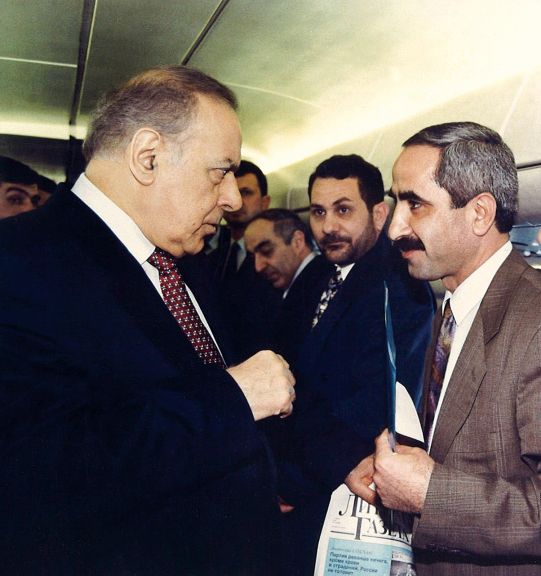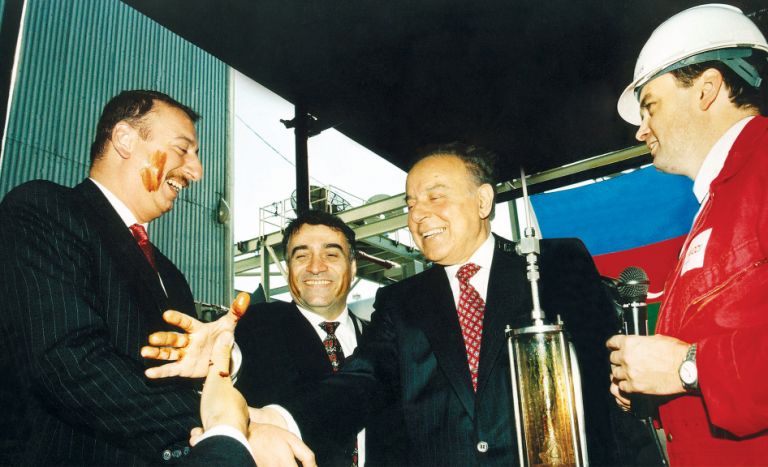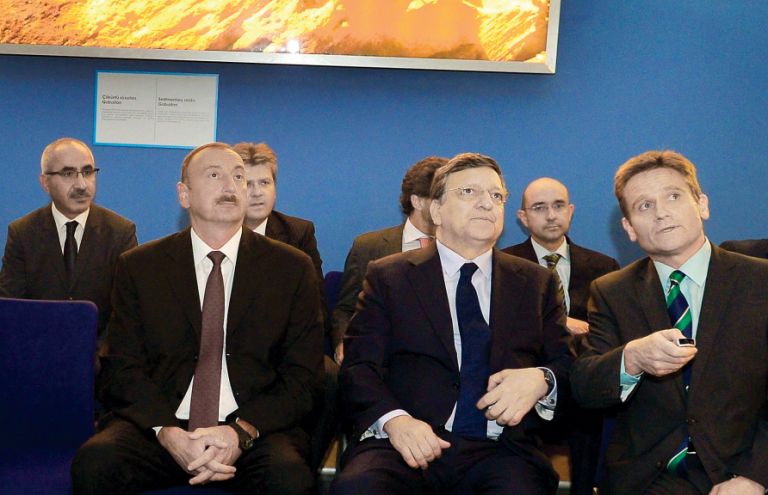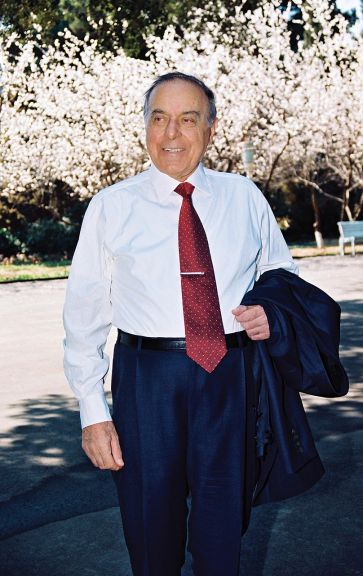“I am happy to have participated in the drawing up and signing of this contract. I realise my responsibility and I am hopeful that future generations will appreciate today`s historic event.”
The Contract of the Century, signed on 20 September 1994, set Azerbaijan on a path of stability and economic growth. This September marked 21 years since the contract was signed and Azerbaijan is continuing to reap its rewards and to establish itself as a significant energy and transport partner in the region. BP’s Guivami Rahimli pays tribute to the Azerbaijani leader behind the agreement, former president, Heydar Aliyev.The Contract of the Century, signed on 20 September 1994, set Azerbaijan on a path of stability and economic growth. This September marked 21 years since the contract was signed and Azerbaijan is continuing to reap its rewards and to establish itself as a significant energy and transport partner in the region. BP’s Guivami Rahimli pays tribute to the Azerbaijani leader behind the agreement, former president, Heydar Aliyev.
Aliyev’s intervention
The early years of Azerbaijan’s renewed independence (from 1991-1993) were a very challenging time with instability and various crises in the country. Heydar Aliyev made a political comeback in 1993 to rescue his nation and everyone, including his critics, credit him for not letting competing forces in the country and the war in Karabakh tear the nation apart in those early years. President Aliyev represented security during those very dark times after the collapse of the Soviet Union.
His presidency produced an outstanding era of confidence and trust. For many Azerbaijanis Heydar Aliyev was our greatest leader; he had once been one of the most influential leaders of a vast empire, the USSR, which covered one sixth of the world’s landmass. His wealth of political experience and his personality meant that he was uniquely equipped to lead Azerbaijanis through the many crises facing the country. He had the ability to inspire others to act, it was as if he led our nation by charisma alone.Who could have negotiated better with the big players in the oil game, with Russia and Iran, powerful and possibly dangerous neighbours in those difficult times after independence?
The main problem for Azerbaijan after the Soviet Union’s collapse was how to attract sufficient foreign investment to develop the country’s hydrocarbon reserves, as there was still a risk associated with doing business in this part of the world. Heydar Aliyev, more than any other post-Soviet leader, understood the need for foreign investment if Azerbaijan was to escape the Soviet legacy of economic inefficiency and in 1994, during the first year of his presidency, Azerbaijan signed the Contract of the Century - an unprecedented multi-billion dollar production-sharing agreement with foreign oil companies. This was the first and largest contract of its type ever signed in the former Soviet Union and the results followed when Azerbaijan’s economy recorded the fastest growth in the world.
The key to this success was the president’s understanding that foreign investors would benefit from an investor-friendly legal and business environment, which Baku provided. Today Azerbaijan’s business and investment environment is regarded as a leading model for oil producing countries.
Azerbaijan-Norway Friendship Society
I was blessed by the opportunity to meet Heydar Aliyev on several occasions as president of the Azerbaijan-Norway Friendship Society. The Society was established in 1995 to create bonds of cooperation between Norway and Azerbaijan across a wide range of areas, including culture, education and business. President Aliyev was also among the honoured guests of the Friendship Society. Despite his busy schedule, he received Norwegian guests invited to the Society’s events; these included world famous archaeologist and historian Thor Heyerdahl, a leading expert on foreign affairs from the Oslo Institute of Foreign Studies, Arne Olav Brundtland (husband of former prime minister, Gro Harlem Brundtland) and Norwegian parliamentarians. Norway had started exploring the oil fields discovered just over two decades before in the North Sea and this took the country from bottom of the table of developed countries in Europe to the top.
Heydar Aliyev valued the Friendship Society’s work to enhance relationships between our two countries and facilitated opportunities to benefit from Norway’s experience. As a result of the Society’s efforts, in 1996 Baku joined the World Energy Cities Partnership, whose members are globally recognised as international energy capitals. The same year, with the president’s blessing, Mayor of Baku Rafael Allahverdiyev and I attended the Society’s annual meeting in the Norwegian city of Stavanger to learn from and engage with the World Energy Cities Partnership.
Another benefit of Norway’s experience was the establishment of the State Oil Fund in Azerbaijan to guarantee its citizens’ prosperity for decades to come. Heydar Aliyev tasked Prime Minister Artur Rasizade, who visited Norway at about the same time as the Mayor of Baku’s delegation, with learning from Norway’s experience of managing their Oil Fund and collecting revenue from oil profits. And during the president’s official visit to Western Europe he included me - the only non-governmental representative - in his delegation as someone who had made a strong contribution to bilateral relations between Azerbaijan and Norway.
President Aliyev represented security during those very dark times after the collapse of the Soviet Union
Culture
Heydar Aliyev was well aware that, along with economic development, one of the key elements of independence is culture. He supported Azerbaijan’s cultural heritage, believing it to be the fundamental component of a country’s national identity. A strong sense of identity enables a nation to stay strong even when surrounding political forces challenge that nation and its right to exist. The president was acutely aware that language is one of the main factors in building a sovereign nation.In 1978, during the Soviet period, Heydar Aliyev was first to designate Azerbaijani as the official language. After independence in 1991, Azerbaijani was declared the state language, and Latin the official alphabet. However, a decade after independence people were still using the Cyrillic alphabet and the Russian language in government institutions. To strengthen the use of the Azerbaijani language, Heydar Aliyev issued a deadline and a presidential decree making it obligatory for all official documents in all governmental offices to be written in the Azerbaijani language in the modified Latin alphabet.
The president had the phenomenal personal qualities essential for power politics: a photographic memory, strong argument and the ability to bring people, including opponents, to his camp. The power of his presence was palpable and his charisma drew in many of the great intellectuals of the day. He spoke confidently and to the point. His words changed lives, changed history. I witnessed how frank and well informed he was, and how decisive in action. The signing and successful implementation of the Contract of the Century was the brilliant result of an oil policy that still underpins Azerbaijan’s economic development. He brought in 12 foreign oil companies from 7 countries. Some of the companies were initially hesitant, but after meeting the president they changed their minds and asked to be involved. Through their involvement, Heydar Aliyev wanted to share and mitigate the possible risks between all the key players, to secure Azerbaijan’s independence, as well as its economic growth and prosperity.
This was the first and largest contract of its type ever signed in the former Soviet Union and the results followed when Azerbaijan’s economy recorded the fastest growth in the world.
Heydar Aliyev loved his country and its history. He knew history very well and understood that it is not just about the past, but also about the present, and that each new era will be judged by future generations. In one of his last interviews, he mentioned that to ensure Azerbaijan’s prosperous future, those who took his place would need to follow the strategy he had set forth:
Future leaders must pursue the policy that I have put in place. If they do, they will succeed. If not, then Azerbaijan will face enormous difficulties.
Elaborating, he underlined that Azerbaijan had to consider the interests of every country. At the same time, Azerbaijan had its own independent policy and would not fall victim to any other country’s policies.
A legacy of continued development
His vision and strategy enhanced regional cooperation in the South Caucasus, which benefited Azerbaijan’s neighbours. The Baku-Tbilisi-Ceyhan oil and the Baku-Tbilisi-Erzurum gas pipelines have transformed strategic realities in the South Caucasus. The energy networks of Azerbaijan, Georgia and Turkey have become more integrated, increasing the significance of the East-West energy corridor. Transportation is also becoming increasingly important. The Kars-Tbilisi-Baku railway project will link the railway networks of Azerbaijan, Georgia and Turkey and will further integrate the South Caucasus region into Europe. Armenia, which still holds Azerbaijani territory, has isolated itself from these regional projects and this isolation will continue unless Armenia ends its occupation of Azerbaijani land.
The power of his presence was palpable and his charisma drew in many of the great intellectuals of the day
Now, looking back on what Heydar Aliyev gave to his country, you may be sure that Azerbaijan has achieved tremendous successes in building a prosperous nation by following his vision and strategy, exemplified by the Contract of the Century. President Ilham Aliyev, who took on the legacy of the great leader, has prepared well for a future surge in the country’s economic growth. Azerbaijan today is widely known as a successful model. It maintains a delicate balance between regional actors and great powers, strengthening the nation’s freedom while developing its economy, which in turn increases stability.
Azerbaijan now has a fundamental role in energy security for the EU, through the new Southern Gas Corridor project. The President of the European Commission Jose Manuel Barroso was invited by Ilham Aliyev to Sangachal near Baku to see one of the world’s biggest oil terminals in June 2014; he described Azerbaijan’s hydrocarbon projects as ‘‘a strategic energy avenue for the 21st century with truly geostrategic significance.’’ It was Heydar Aliyev who laid the foundations for a prosperous future for Azerbaijan. His masterminding of the Contract of the Century played an essential role in raising the investment and development projects to be seen throughout the country and indeed the whole region.
I am proud to have witnessed the great achievement of the Contract of the Century and to have been part of Azerbaijan’s history in the making, under the leadership of Heydar Aliyev and his legacy.
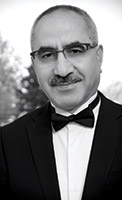 About the author: Guivami Rahimli joined BP in 1995 as a Government Relations Expert and currently serves as the Sangachal Terminal Social Manager for the BP Azerbaijan, Georgia and Turkey Region.
About the author: Guivami Rahimli joined BP in 1995 as a Government Relations Expert and currently serves as the Sangachal Terminal Social Manager for the BP Azerbaijan, Georgia and Turkey Region.
